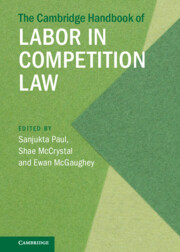
-
Select format
-
- Publisher:
- Cambridge University Press
- Publication date:
- May 2022
- May 2022
- ISBN:
- 9781108909570
- 9781108830317
- Dimensions:
- (254 x 178 mm)
- Weight & Pages:
- 0.8kg, 334 Pages
- Dimensions:
- Weight & Pages:
- Series:
- Cambridge Law Handbooks
- Subjects:
- Law: General Interest, Employment Law, Law, Competition Law
- Collection:
- Cambridge Law Handbooks
You may already have access via personal or institutional login- Series:
- Cambridge Law Handbooks
- Subjects:
- Law: General Interest, Employment Law, Law, Competition Law
- Collection:
- Cambridge Law Handbooks
Book description
As scholars and policymakers around the world seek a systematic approach to the question of 'gig work,' one of its regulatory dimensions – the intersection of labor and competition law – points toward a deeper reconceptualization of the conventional legal and economic categories typically brought to bear upon it. A comparative approach to the question of gig work further reveals the variety and contingency of background assumptions that are often overlooked in the context of domestic policy debates. By combining a detailed comparative doctrinal survey of the regulation of non-employee workers in domestic competition law systems with a set of essays reframing the underlying questions raised – in terms of international legal frameworks, freedom of association norms, alternative approaches to law and economics, and more – The Cambridge Handbook of Labor in Competition Law moves the debates over the fissured workplace and the labor – competition law intersection forward in novel ways.
Reviews
‘… a great book for both labour and competition lawyers and anyone interested in this crucial topic.’
Marco Biasi Source: European Journal of Social Security
‘… this handbook offers a timely and constructive response to this pressing issue drawing on various jurisdictions with distinct economic, legal and political contexts. It might also prompt readers to generate a comparative and international perspective on the emerging normative expansion within competition law itself, with work, workers and smaller players at or near its core.’
Ou Lin Source: British Journal of Industrial Relations
Contents
Metrics
Altmetric attention score
Full text views
Full text views help Loading metrics...
Loading metrics...
* Views captured on Cambridge Core between #date#. This data will be updated every 24 hours.
Usage data cannot currently be displayed.
Accessibility standard: Unknown
Why this information is here
This section outlines the accessibility features of this content - including support for screen readers, full keyboard navigation and high-contrast display options. This may not be relevant for you.
Accessibility Information
Accessibility compliance for the PDF of this book is currently unknown and may be updated in the future.


